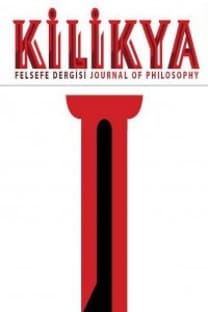Padovalı Marsilius’da İktidarın Dünyeviliği
Asıl ereği devleti laik temeller üzerine kurmak olan Marsilius’un modern,
hatta devrimci olan yanı da budur. Reformcular üzerine büyük etkisi olan
Marsilius’un reformculardan ayrıldığı en önemli çizgisi laik bir düşünür olmasıdır.
Siyasal düşüncesi ve anlayışı bakımından Aristotelesçi olan Marsilius’un ideali,
ortaçağın teokratik toplum yapısı yerine laik bir toplum düzeni kurmaktır.
Marsilius’a göre laik bir toplum dünyevi erekler üzerine kuruludur; böyle bir
toplum iyi yaşam ereğini öbür dünyada değil, bu dünyada gerçekleştirmeye
çalışmalıdır. Tam da bu nedenle, bir siyasal toplumda dini kurallar ve dogmalara
yer yoktur. Dini öğreti yalnızca ruhun esenliğini ilgilendirdiğine göre, bu
hakikatlerden sapanlar ancak öbür dünyada bunun cezasını görebilirler.
Anahtar Kelimeler:
Padovalı Marsilius, Aristoteles, İktidarın Dünyeviliği, Laik Devlet, Din ve Vicdan Özgürlüğü.
The Worldliness of Rulership at the “Marsilius of Padua”
The real goal of Marsilius is to establish the state on secular bases rather
than all the old worldly powers alone. This is the modern, even revolutionary
side of Marsilius. Marsilius, who had a great influence on reformers, was a secular
thinker and by being a secular thinker, he was different from other reformers.
The ideal of Marsilius, the Aristotelian in political thought and understanding, is
to establish a secular society structure instead of the theocratic society structure
in the middle ages. According to Marsilius, a secular society is based on earthly
goals; such a society should try to achieve good living conditions in this world,
not in the other world. That is precisely why there is no religious rule and dogma
in a political society. Since religious truths are concerned only with spiritual wellbeing,
those who deviate from these truths can only be punished in the other
world.
Keywords:
Marsilius of Padua, Worldliness of Rulership, Secular State, Aristotle, Freedom of Religion and Conscience,
___
- Aristotle. (2012). Politics. J. Sachs (Çev.) İndianapolis/Cambridge: Focus Publishing.
- Batuhan, H. (2007). Semiyotik, Fanatizm ve Tolerans. Ankara: Nobel Yayın Dağıtım.
- Canning, J. (1996). A History of Medieval Political Thought : 300-1450. New York, NY: Routledge.
- D’Entrèves, A. P. (1959). The Medieval Contribution to Political Thought: Thomas Aquinas, Marsilius of Padua, Richard Hooker. New York, NY: Humanities Press.
- Gilson, E. (2007). Ortaçağ’da Felsefe. (A. Meral, Çev.). İstanbul: Kabalcı Yayınevi.
- Lecler, J. & Westow, T. L. (1960). Toleration and the Reformation. New York, NY: Association Press.
- Marsilius of Padua. (2005). Defensor Pacis. A. Brett (Ed. ve Çev.). Cambridge: Cambridge University Press.
- Marsilio Padua’lı, (2012). Barış Savunucusu. M. Tunçay (Der. ve Çev.), Batı’da Siyasal Düşünceler Tarihi (3. Baskı, ss. 469-488), içinde. İstanbul: İstanbul Bilgi Üniversitesi Yayınları.
- Quillet, J. (2011). “Marsilio Padovalı” maddesi. (İ. Yerguz, Çev.), Siyaset Felsefesi Sözlüğü (2. Baskı). İstanbul: İletişim Yayınları.
- Russel, Bertrand. (1996). Batı Felsefesi Tarihi, (M. Sencer, Çev.), İstanbul: Say Yayınları.
- Strauss, L. & Cropsey, J. (1963). History of Political Philosophy. Chicago, IL: Rand McNally.
- Yayın Aralığı: Yılda 2 Sayı
- Başlangıç: 2014
- Yayıncı: Eray Yağanak
